If you’ve been using Blueprint for therapy outcomes measurement, documentation, or client progress tracking, you may have started to notice its limits.
For some, the platform feels rigid, as your caseload grows. For others, it’s the lack of deep customization, integrations, or advanced note-taking features that creates friction.
The good news? You’re not stuck with a one-size-fits-all solution.
The mental health tech space has exploded in recent years, and there are now dozens of tools designed to support therapists, solo practitioners, and larger practices with more affordable pricing, flexible documentation workflows, and HIPAA-compliant security solutions to protect sensitive client data from online attacks or data breaches.
This guide walks you through the 10 best Blueprint alternatives in 2026, comparing each across features, pricing, pros and cons, and user reviews.
So, whether you’re a solo therapist looking for a lightweight AI note-taker or a multi-location practice in need of an enterprise-grade EHR, you’ll find options here that better align with your needs while streamlining workflows and boosting efficiency.
Why Users Look for Blueprint Alternatives
Blueprint has built a solid reputation for measurement-based care, outcomes tracking, and client engagement tools. But as practices evolve, many therapists start exploring alternatives for reasons like these:
- Features Overload- Many therapists only want efficient, accurate note-taking. They find Blueprint’s broader feature set overwhelming when all they need is simple, streamlined documentation.
- Limited Customization - Templates and note formats still lack flexibility for therapists wanting documentation tailored to their style or workflows.
- Transcription Accuracy Concerns - Some users report that AI-generated notes struggle with clinical terminology, requiring extra editing time.
- Steep Learning Curve - Onboarding can feel heavy for therapists with limited time to adapt to new platforms.
- Integration Gaps -Native integrations with popular EHRs and practice management tools remain limited compared to newer platforms.
- Better Fit Exists Elsewhere - Many alternatives now offer AI-powered note generation, real-time transcription, and native EHR autofill, features that Blueprint doesn’t fully provide.
Top 10 Blueprint Alternatives in 2026
To make your search easier, we’ve rounded up the best tools that therapists, clinicians, and healthcare professionals are choosing instead of Blueprint. Each option offers unique strengths depending on your practice size, workflow, and budget.
1. Supanote – Best for AI-Powered Therapy Notes
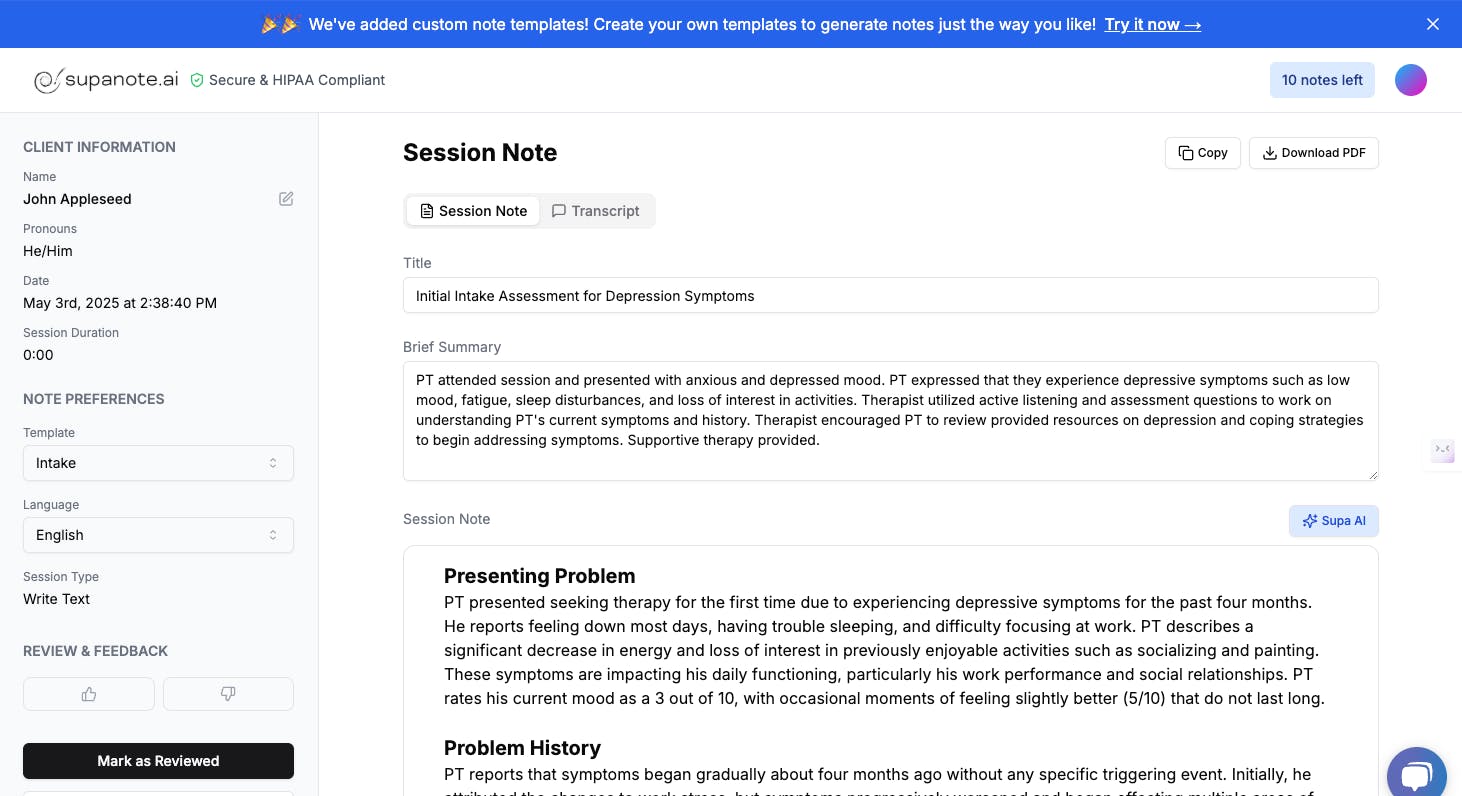
Supanote is built specifically for mental health professionals, offering AI-generated, insurance-ready therapy notes that save time without sacrificing quality. Unlike generic scribes, it provides native EHR autofill for platforms like SimplePractice and TherapyNotes, so you can push notes directly into your system with a single click. The AI is trained on thousands of real clinical notes, adapts to your personal style, and supports all major formats, from SOAP to EMDR.
Key Features
- AI-powered progress notes (SOAP, DAP, GIRP, PIRP, PIE, EMDR, intake, discharge)
- Supports all input methods: live session capture, audio upload, dictation, or manual entry
- Native EHR autofill integration with SimplePractice, TherapyNotes, and Valant
- Adjustable note detail + ability to save custom templates
- HIPAA compliance verified by third-party audits
Pricing
- $19.99/month (billed annually) for up to 40 notes; higher tiers available for unlimited usage. 14-day free trial with full access
- Free trial available
Pros
- Built specifically for mental health therapists
- Seamless native EHR autofill
- Affordable compared to most AI scribes
Cons
- Advanced analytics and reporting still limited
Best For
Solo practitioners and small-to-mid-sized practices who want affordable, therapy-specific AI notes with true EHR integration.
2. Twofold Health – Best for Scalable Healthcare Documentation
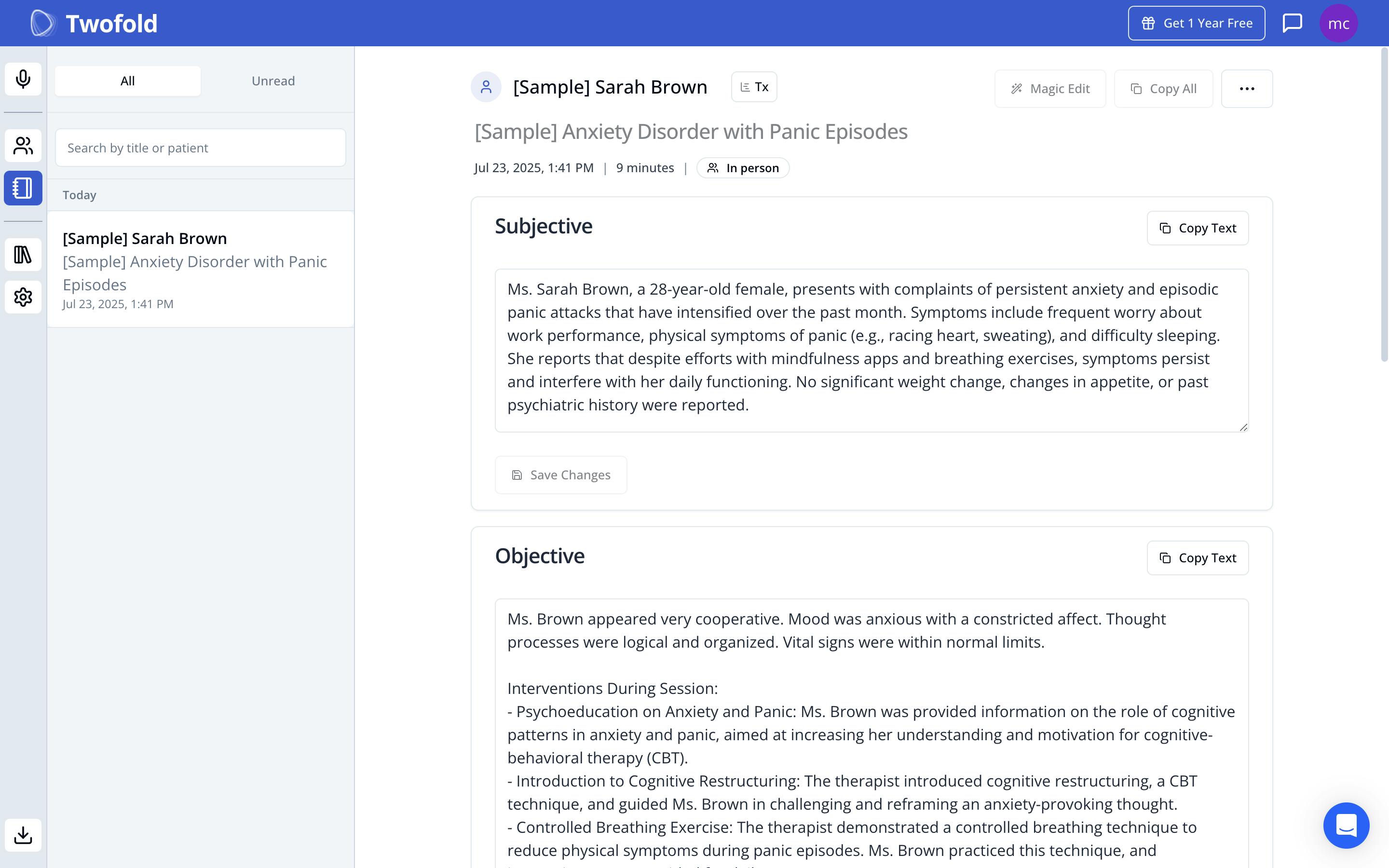
Twofold Health is an AI-powered documentation tool designed to support clinicians across different healthcare settings. It focuses on scalability and flexibility, making it a good option for small clinics that expect to grow or large teams that need consistent note quality across providers. The platform supports unlimited usage, integrates with major EHRs, and provides HIPAA-compliant workflows that help practices reduce time spent on paperwork while maintaining accuracy.
Key Features
- AI-generated clinical notes with customizable templates
- Unlimited usage plans available
- Integration with leading EHR systems
- Supports both live dictation and audio upload
- HIPAA-compliant infrastructure
Pricing
- Free plan (20 notes/month) or $49/month billed annually for unlimited usage.
- Free trial available, with custom pricing for group plans tailored to clinics and teams.
Pros
- Flat-rate pricing with unlimited documentation
- Good fit for clinics with multiple providers
- Flexible input methods (dictation + uploads)
- Strong security and compliance standards
Cons
- May feel overbuilt for solo practitioners
- Interface is less streamlined compared to lighter note tools
Best For
Small-to-mid-sized clinics and group practices looking for affordable unlimited AI documentation with strong compliance and EHR integration.
3. Mentalyc – Best for Simple AI Therapy Notes
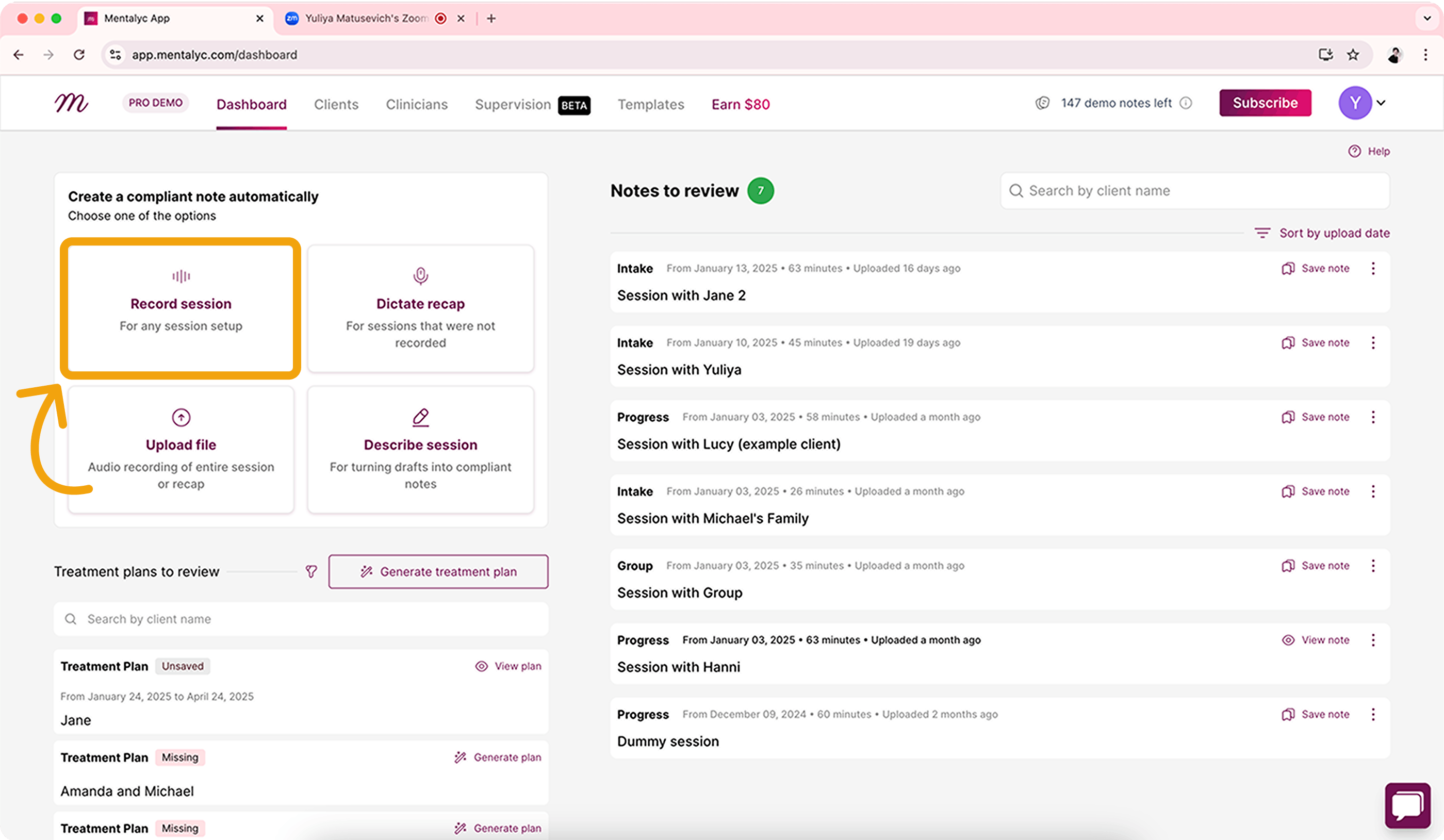
Mentalyc is a lightweight AI note-taking tool built specifically for therapists who want a no-frills, affordable way to generate clinical notes. It doesn’t try to be a full EHR replacement but instead focuses on quickly converting session transcripts or summaries into structured documentation. For clinicians who don’t need complex features but want to cut down on time spent writing SOAP or DAP notes, Mentalyc offers a simple and approachable option.
Key Features
- AI-generated notes from session transcripts or summaries
- Supports SOAP, DAP, and progress notes
- Browser-based interface, no heavy setup required
- HIPAA-compliant platform with encryption
- Affordable pricing compared to larger AI scribe tools
- Alliance Analytics now available – provides insights into therapeutic alliance based on session data
Pricing
- Mini $14.99/month (40 notes), Basic $29.99/month (100 notes), Pro $59.99/month (160 notes), Super $99.99/month (330 notes) - if billed annually
Pros
- Very beginner-friendly and easy to adopt
- Affordable pricing, including a free tier
- Built for therapists rather than generic healthcare
- Minimal learning curve
Cons
- Limited note formats compared to more advanced tools
- No native EHR autofill (copy-paste required)
- Fewer advanced features like analytics or outcomes tracking
Best For
Therapists who want a low-cost, simple AI tool for generating standard therapy notes without the complexity of a full EHR.
4. Upheal – Best for Session Insights and Analytics
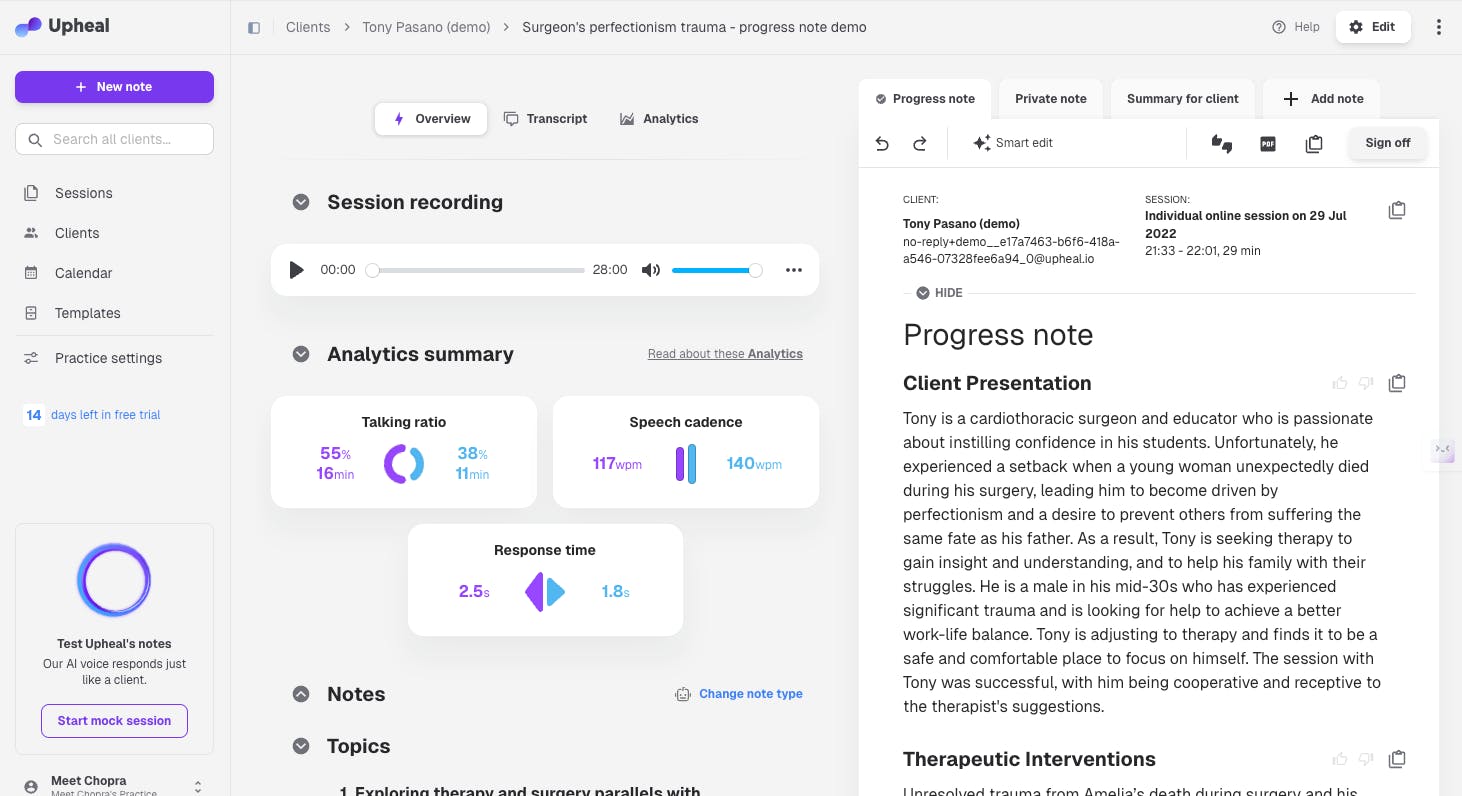
Upheal goes beyond being just a documentation tool. It’s built as a therapy platform that combines AI-powered notes with advanced insights, giving therapists data they can use to improve care. In addition to generating SOAP and progress notes, it tracks metrics like talk-time ratios, emotional tone, and therapy patterns, helping clinicians better understand client dynamics. For therapists who want both documentation and session intelligence in one place, Upheal stands out.
Key Features
- AI-generated therapy notes in SOAP, DAP, and progress formats
- Real-time session analytics: talk-time ratios, sentiment analysis, key topics
- Works with telehealth sessions (Zoom, Google Meet, etc.)
- HIPAA-compliant with secure storage
- Free plan with unlimited basic notes
Pricing
- Free plan (£0/month, unlimited notes), Starter £19/month, Premium £59/month.
Pros
- Combines documentation with powerful session insights
- Free forever plan makes it easy to test
- Works seamlessly with telehealth platforms
- Offers more than just note automation
Cons
- No native EHR autofill
- May be more than needed if you only want quick notes
- Insights are best leveraged by tech-comfortable therapists
Best For
Therapists who want both AI documentation and deeper session analytics to enhance client care.
5. Autonotes AI – Best for Fast, Template-Driven Notes
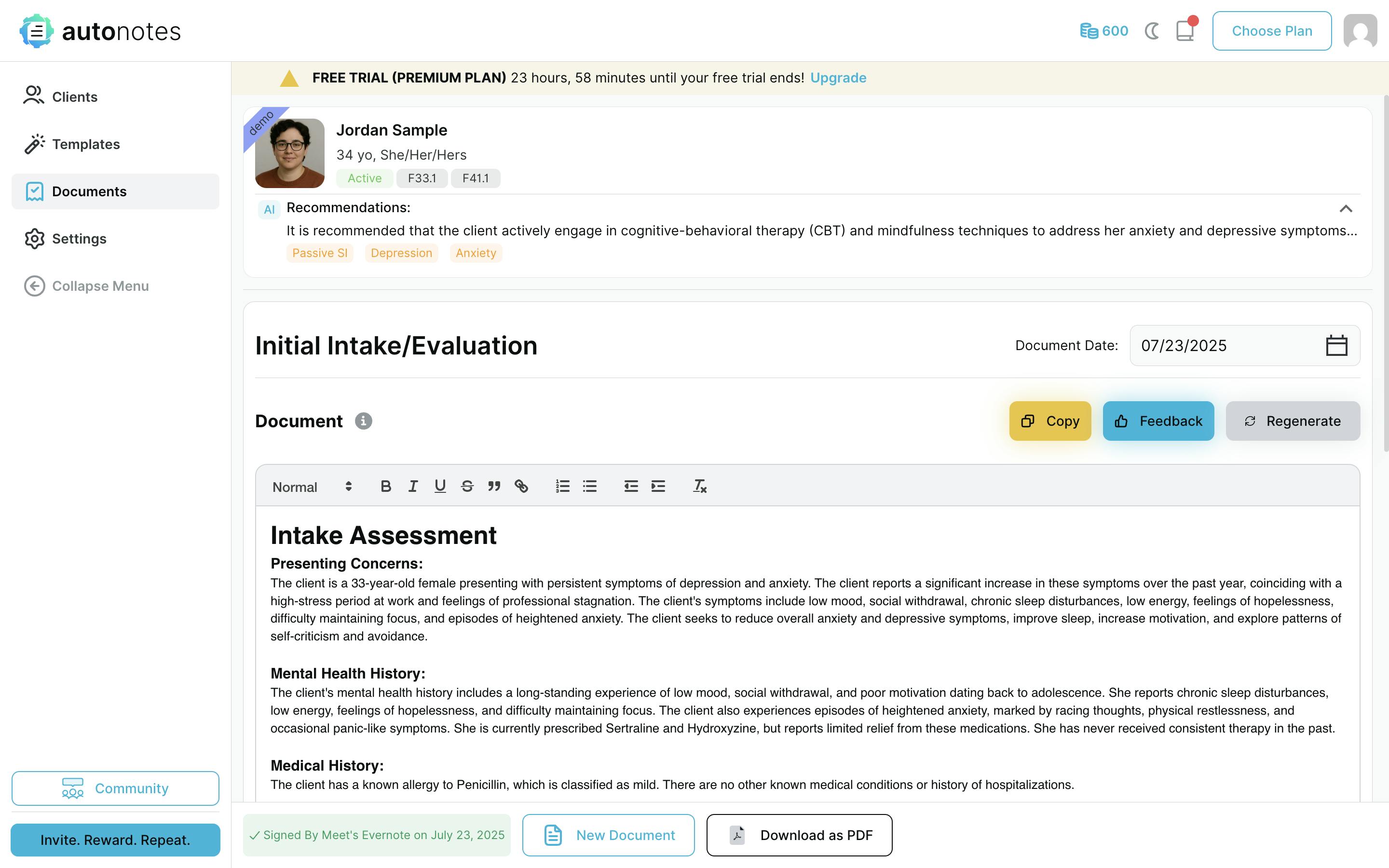
Autonotes AI is built for speed. It’s designed to help clinicians generate structured, professional notes within minutes using a mix of AI automation and ready-to-use templates. The platform emphasizes ease of use, allowing providers to quickly choose a note type, dictate or upload audio, and get a polished draft back instantly. For therapists or medical professionals who value speed and standardization, Autonotes AI offers a straightforward solution.
Key Features
- AI-powered SOAP, DAP, and progress notes
- Large library of pre-built clinical templates
- Supports dictation, transcription, and manual entry
- HIPAA-compliant with encrypted storage
- Customizable style and detail levels
Pricing
- Essential at $250/year, Premium at $499/year, Ultimate at $999/year (billed annually), with custom pricing for Group Practice plans and a free trial available.
Pros
- Extremely fast note generation
- Strong template library for different use cases
- Easy to learn and adopt
- HIPAA-compliant for secure documentation
Cons
- Pricing transparency is limited
- Lacks advanced features like analytics or EHR autofill
- More suited for standardized notes, less for nuanced narratives
Best For
Clinicians who need quick, template-driven notes and want a simple AI assistant without complex setup.
6. Freed AI – Best for AI Medical Scribing
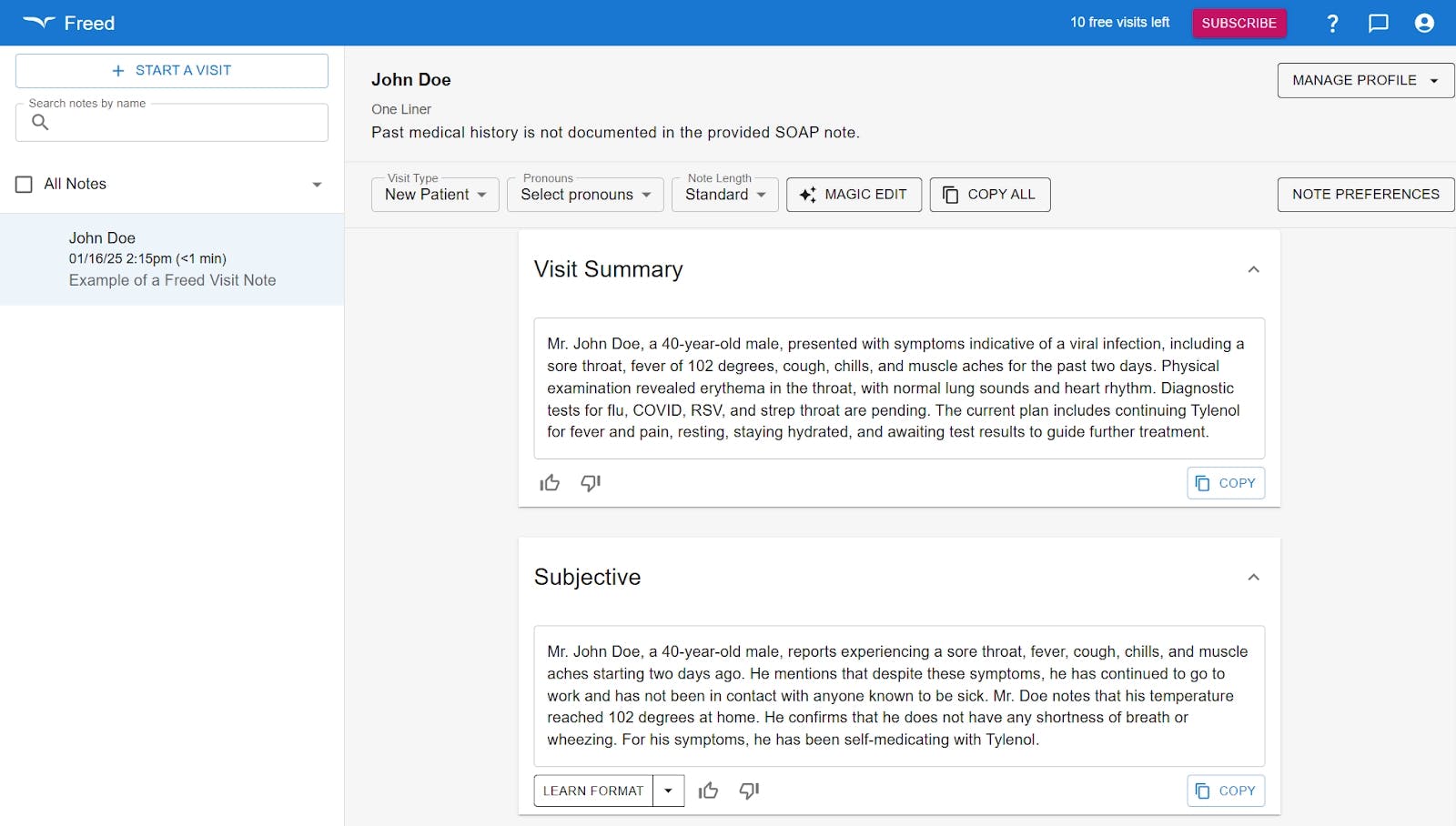
Freed AI is positioned as a medical scribe powered by AI, helping healthcare professionals capture clinical encounters and convert them into structured documentation. Unlike tools built only for therapy, Freed works across diverse healthcare settings including primary care, mental health, and specialty practices. Its strength lies in reducing manual charting time while maintaining compliance and accuracy, making it a popular choice for providers seeking to streamline their documentation process.
Key Features
- AI-powered scribing for medical and therapy notes
- Works across multiple specialties and practice types
- EHR integration for streamlined workflows
- HIPAA-compliant with data protection protocols
- Supports ambient listening and dictation
Pricing
- Starts at $90/month for solo clinicians, $84/month per clinician for 2–9 users (billed annually), with custom pricing for 10+ users. 7-day free trial available
Pros
- Flexible across different healthcare specialties
- Strong accuracy for medical documentation
- EHR integrations available
- Saves time for both therapists and physicians
Cons
- Pricing is not transparent
- May be more expensive for smaller practices
- Focuses more on broad medical use than therapy-specific needs
- No native EHR autofill available (requires manual integration or workarounds)
Best For
Healthcare professionals and clinics in diverse healthcare settings who want an AI medical scribe that integrates with EHRs and reduces manual documentation.
7. Yung Sidekick – Best for Practice Management with Documentation
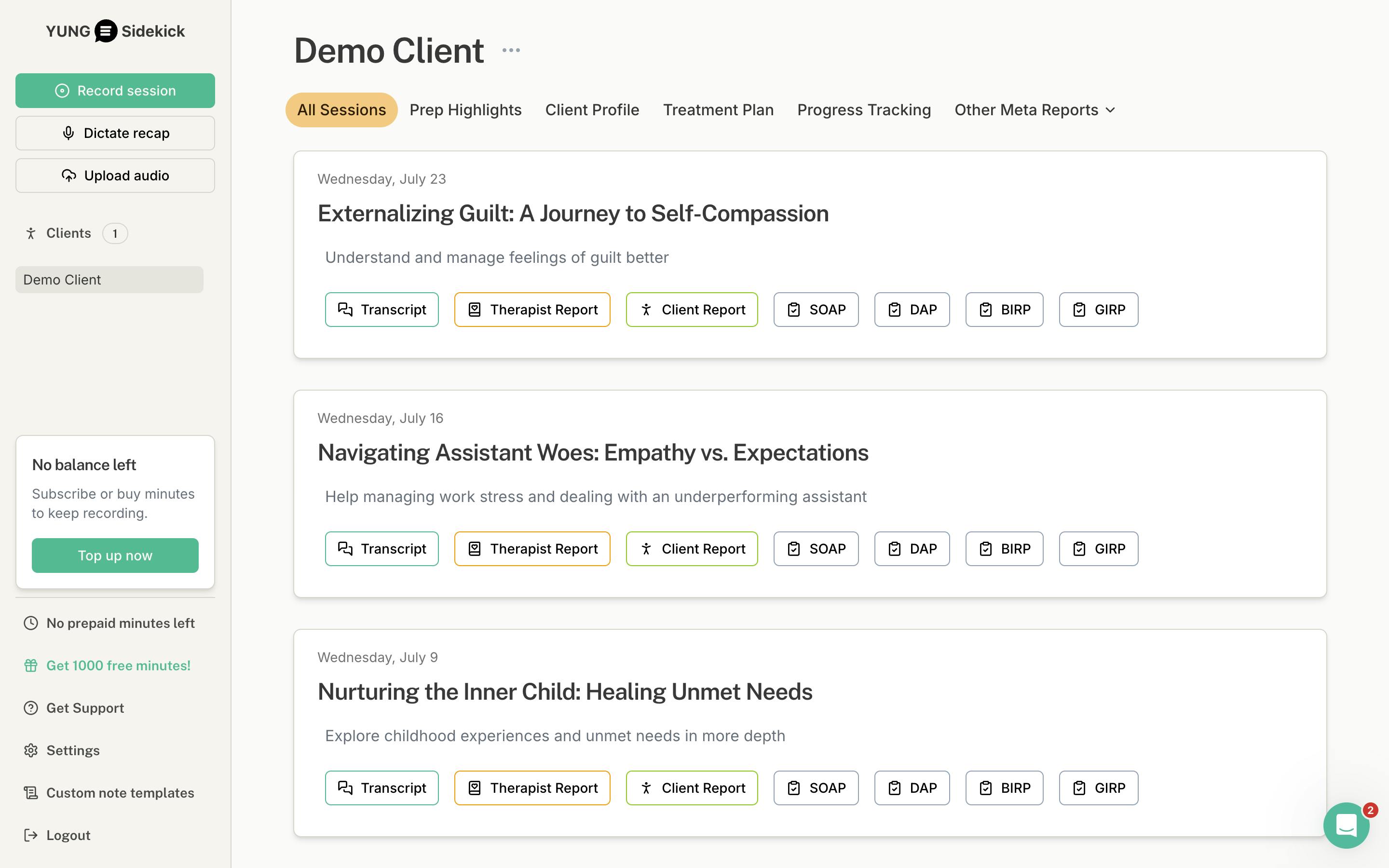
Yung Sidekick is more than just a note generator, it’s a practice management platform designed for mental health professionals. Alongside AI-powered documentation, it offers scheduling, billing, and client management features, aiming to resolve the operational headaches that come with running a private practice. While not as advanced in AI note generation as some competitors, its value lies in providing an all-in-one system for therapists who want documentation plus admin support in one place.
Key Features
- AI-assisted progress notes and treatment plans
- Scheduling, reminders, and billing tools built in
- Client management dashboard with secure record-keeping
- HIPAA-compliant infrastructure
- EHR-like functionality without needing a separate system
Pricing
- It starts with a flexible pricing of $0/month (pay-as-you-go), with plans from $39.99/month (Basic) to $99.99/month (Professional), plus custom pricing for group practices.
Pros
- Combines documentation with practice management tools
- All-in-one platform reduces need for multiple apps
- Built for therapists and small clinics
- HIPAA-compliant for safe record handling
Cons
- Note automation is less advanced than dedicated AI scribe tools
- Lacks native autofill integration with external EHRs
- Interface may feel heavier for those who just want notes
Best For
Therapists and small practices who want documentation plus built-in practice management features in a single platform.
8. TherapyNotes, LLC – Best for Full EHR Functionality
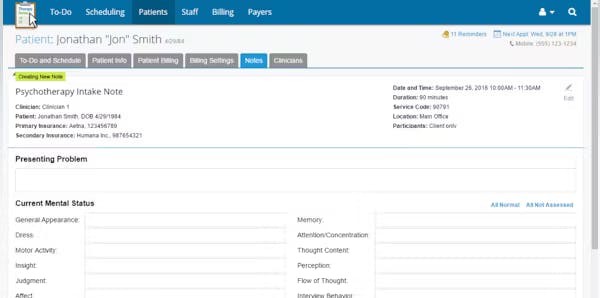
TherapyNotes, LLC is one of the most widely used EHR systems built specifically for mental health professionals. Unlike AI-only documentation tools, it provides a full suite of features, including scheduling, billing, client portals, and secure records management. Its integrated note templates cover SOAP, treatment plans, and progress documentation, making it a complete practice management solution for therapists who want everything under one roof.
Key Features
- Comprehensive EHR with scheduling, billing, and client portals
- Built-in clinical note templates (SOAP, treatment plans, progress notes)
- Telehealth integration with HIPAA-compliant video sessions
- Secure storage and e-prescribing features
- Designed specifically for behavioral health practices
Pricing
- Starts at $59/month for solo practitioners, $69/month for the first clinician in group or enterprise plans (+$40/month per additional clinician).
Pros
- Robust EHR functionality beyond just notes
- Reliable, established platform trusted by thousands of therapists
- HIPAA-compliant with advanced security
- All-in-one system for documentation and practice operations
Cons
- Heavier learning curve than lightweight AI note tools
- Does not offer advanced AI note automation like Supanote or DeepScribe
- Monthly cost adds up for larger teams
Best For
Clinics and group practices seeking a comprehensive EHR solution with integrated documentation, scheduling, and billing.
9. DeepScribe – Best for AI Scribing with Human QA
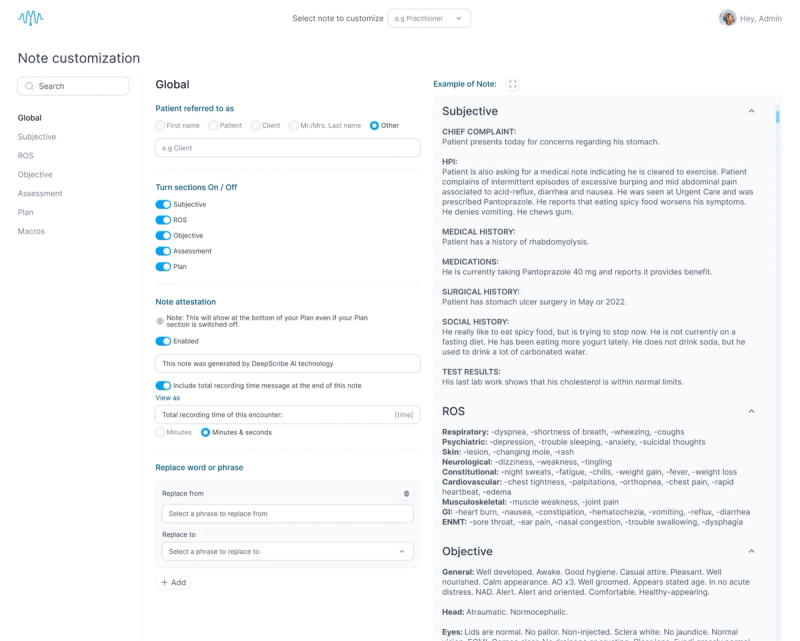
DeepScribe is an AI-powered medical scribe designed to capture clinician–patient encounters and turn them into detailed, structured notes. Unlike lighter tools, DeepScribe combines its AI transcription engine with a layer of human quality assurance (QA) to ensure accuracy before notes reach the provider. It’s widely used in healthcare settings that require higher reliability, from mental health practices to large healthcare organizations.
Key Features
- AI transcription + human QA for high accuracy
- Supports SOAP, progress notes, and medical documentation
- EHR integration with popular systems
- HIPAA-compliant platform with enterprise-grade security
- Works in both therapy and general healthcare environments
Pricing
- It starts at $400/month per provider for the non-EHR plan, with custom pricing for EHR-integrated plans that offer enhanced functionality and direct EHR sync.
Pros
- Hybrid model (AI + human QA) improves accuracy
- Strong EHR integration options
- Suitable for both mental health and broader medical practices
- Enterprise-ready compliance and data protection
Cons
- Significantly more expensive than most competitors
- Slower turnaround than pure AI tools (due to human QA step)
- Overkill for solo practitioners with lighter documentation needs
Best For
Mid-to-large healthcare organizations or therapy practices that require high-accuracy, QA-verified documentation with EHR integration.
10. Abridge – Best for Ambient AI Scribing
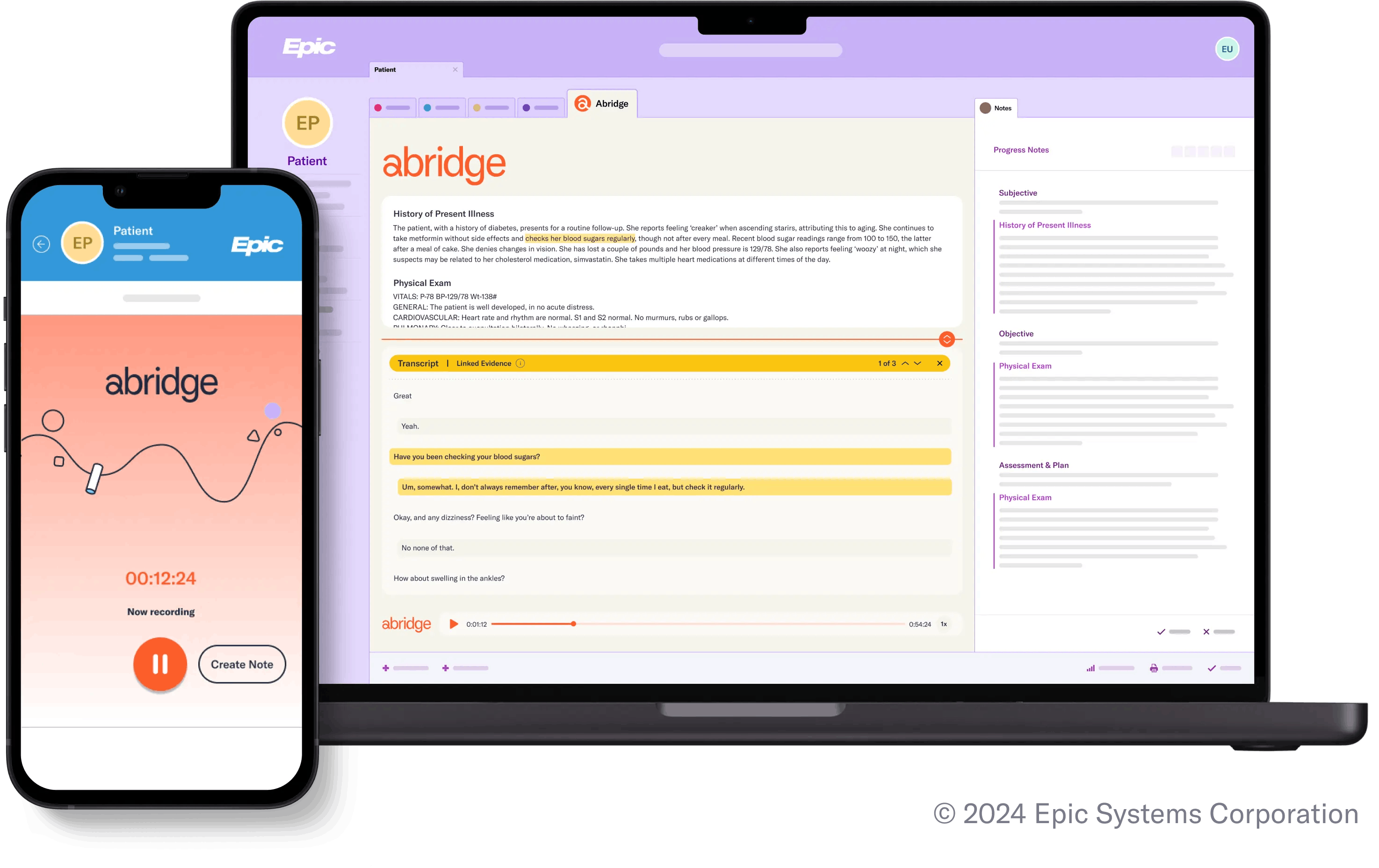
Abridge is an ambient AI scribe that automatically listens to clinical encounters and generates structured documentation in real time. It’s widely adopted in larger healthcare organizations and hospitals but is also gaining traction among mental health providers. The strength of Abridge lies in its hands-free approach, clinicians can focus fully on the client while the AI handles charting, then syncs the note into the EHR.
Key Features
- Ambient AI scribe that captures conversations in real time
- Automatically generates SOAP and structured medical notes
- Direct integration with major EHR systems like Epic and Cerner
- HIPAA-compliant with enterprise-grade data protection
- Designed for multiple specialties, including mental health
Pricing
- Estimated pricing for Abridge starts at $250 per month.
Pros
- Hands-free note-taking with ambient scribing
- Strong EHR integrations, especially for large organizations
- Reduces clinician workload significantly
- Suitable for both therapy and general healthcare use
Cons
- More expensive than lighter AI tools
- Designed primarily for enterprise use; less ideal for solo therapists
- Requires consistent internet and audio setup for best results
Best For
Large clinics and healthcare organizations that want real-time, ambient AI documentation integrated directly into their EHR.
Blueprint Alternatives Comparison Table
Here’s a quick comparison of the top Blueprint alternatives to help you make an informed decision:
Tool | Starting Price | Best Feature | Free Trial | Best For |
|---|---|---|---|---|
Supanote | $19.99/mo | Native EHR autofill for therapy notes | Yes | Solo practitioners & small practices |
Twofold Health | $49/mo (annual) | Unlimited usage plans | Yes | Small-to-mid-sized clinics |
Mentlayc | $20/mo (Free plan available) | Lightweight AI therapy notes | Yes (Free tier) | Therapists wanting a simple, low-cost tool |
Upheal | Free (basic notes), $29/mo | Session insights + analytics | Yes | Therapists wanting documentation + insights |
Autonotes AI | Custom pricing | Fast, template-driven note generation | No | Clinicians needing quick, structured notes |
Freed AI | Custom pricing | AI medical scribe across specialties | No | Diverse healthcare settings |
Yung Sidekick | Custom pricing | Documentation + practice management | No | Therapists wanting an all-in-one platform |
TherapyNotes, LLC | $49/mo | Full EHR functionality | No | Clinics needing comprehensive EHR |
DeepScribe | $400–$500/mo | AI + human QA for high accuracy | No | Mid-to-large healthcare organizations |
Abridge | $199–$250/mo | Real-time ambient scribing | No | Large healthcare organizations |
Note: All tools listed here are HIPAA-compliant, ensuring secure handling of client and patient data.
Mistakes to Avoid When Switching
Choosing a Blueprint alternative can transform your workflow—but only if you make the switch carefully. Here are some common mistakes to avoid:
- Skipping the trial phase – Always test the tool with real sessions before committing to a paid plan.
- Ignoring HIPAA/security compliance – Not all documentation tools are equally transparent about compliance; double-check before onboarding clients.
- Overlooking EHR compatibility – Make sure the platform integrates (or at least works smoothly) with your existing EHR or practice management software.
- Paying for unnecessary features – Don’t over-invest in platforms with analytics or billing features you don’t plan to use.
- Forgetting data migration – If you’re moving away from Blueprint, plan how past notes and records will transfer into your new system.
- Not considering scalability – A tool that works for solo practice today may not be ideal if you expand into a group practice later.
Checklist for Choosing the Right Alternative
Use this checklist to evaluate each Blueprint alternative and make sure it aligns with your practice needs:
✅ | Key Factor | Why It Matters |
|---|---|---|
☐ | Budget fit | Ensures the tool stays affordable as your caseload grows. |
☐ | HIPAA/security compliance | Protects client data and keeps your practice legally safe. |
☐ | EHR integration options | Saves time by reducing copy-paste and supporting smooth workflows. |
☐ | Ease of use / learning curve | Lets you and your team adopt the tool quickly without frustration. |
☐ | Templates & customization | Supports the note formats (SOAP, DAP, EMDR, etc.) you actually use. |
☐ | Data migration support | Ensures your past notes and client history transfer smoothly. |
☐ | Scalability | Makes sure the platform can grow with your practice, from solo to group. |
☐ | Customer support & training | Provides help when you need it and reduces downtime. |
Checking off these factors will help you narrow down the best Blueprint alternative for your workflow, compliance requirements, and budget.
Quick Comparison Overview
- Supanote excels in native EHR autofill and mental health-specialized AI notes with flexible input methods.
- Twofold Health stands out with unlimited usage plans and scalable AI documentation for growing clinics.
- Mentalyc is a beginner-friendly, affordable AI tool focused on standard SOAP and DAP notes.
- Upheal combines therapy note automation with deep session insights and analytics.
- Autonotes AI offers ultra-fast, template-driven note creation with a focus on speed and structure.
- Freed AI works across specialties as a general-purpose AI scribe with strong transcription accuracy.
- Yung Sidekick bundles documentation with scheduling and billing for all-in-one practice management.
- TherapyNotes, LLC is a full-fledged EHR system built for behavioral health, offering robust operations features.
- DeepScribe delivers high-accuracy notes using a hybrid model of AI and human QA.
- Abridge provides real-time ambient AI scribing with seamless integration into large EHR systems.
Your best fit depends on your documentation needs, existing software stack, team size, and budget. Most offer free trials or flexible plans, test before you commit.
Key Factors to Consider Before Choosing
Switching from Blueprint to another platform can significantly improve your workflow—but only if you choose the right fit. Here are the most important factors to weigh before making your decision:
- Cost vs. Scalability – A tool that’s cheap upfront may become costly as your caseload grows. Look for pricing models that fit both your current and future practice size.
- Documentation Depth – Some alternatives focus on basic progress notes, while others (like Supanote or DeepScribe) offer analytics, session insights, or detailed medical documentation. Match this to your actual needs.
- AI Accuracy & Customization – Check whether the tool adapts to your style and supports multiple formats (SOAP, DAP, EMDR, treatment plans). Higher accuracy means less editing.
- EHR Integration – If you rely on TherapyNotes, SimplePractice, or Epic, pick a platform like Supanote with native autofill or direct integration to save time.
- Security & Compliance – All listed tools are HIPAA-compliant, but enterprise-level organizations may need advanced features like audit trails, BAAs, and encryption standards.
- Support & Training – For solo practitioners, ease of use matters most. For clinics, strong onboarding, training, and customer support are equally important.
- Practice Fit – Consider whether you need just documentation (Supanote, Mentalyc) or an all-in-one system with billing and scheduling (TherapyNotes).
Evaluating these factors will help you avoid mismatched tools and ensure a smooth transition away from Blueprint.
FAQs
Q. Can I migrate my data from Blueprint to another platform?
A. Yes, most alternatives allow some form of data migration, though the process varies. Some offer direct import tools, while others require manual export and upload. Always confirm with the provider before switching.
Q. How do pricing models differ among alternatives?
A. Pricing varies widely, some tools like Supanote and Mentlayc start around $20/month, while enterprise-grade options like DeepScribe can cost hundreds per month. Check whether pricing is per user, per note, or flat-rate.
Q. Which alternatives integrate with EHRs like TherapyNotes or SimplePractice?
A. Supanote offers native autofill with SimplePractice and TherapyNotes, while tools like DeepScribe, Freed AI, and Abridge integrate with larger EHRs such as Epic or Cerner. Lighter tools like Mentlayc usually require copy-paste.
Q. Are all these tools HIPAA-compliant?
A. Yes, all tools in this comparison are HIPAA-compliant, but the level of security (e.g., enterprise-grade encryption, audit trails) varies. If you handle sensitive PHI or work in larger organizations, double-check the compliance documentation.
Q. Which alternative is best for solo practitioners?
A. Supanote and Mentlayc are often best for solo therapists due to their affordability, easy setup, and therapy-specific features.
Q. Which alternatives are better for larger clinics or healthcare organizations?
A. Tools like TherapyNotes, DeepScribe, and Abridge are more suitable for larger practices because they provide robust EHR integration, scalability, and enterprise-level security.
Q. How accurate are AI note tools compared to manual documentation?
A. Accuracy varies, lighter AI tools provide solid drafts but may require edits, while DeepScribe and Abridge use advanced AI (and sometimes human QA) to boost reliability. Testing during the free trial is recommended.
Q. Do these tools support outcome measurement like Blueprint?
A. Most alternatives focus on documentation rather than outcome measurement. However, Upheal provides insights and analytics that can be used alongside outcome tracking.
Q. Are there free or low-cost options available?
A. Yes. Upheal has a free forever plan (basic notes), while Mentlayc also offers a free tier. These are good entry points if you’re testing AI note-taking without financial commitment.
Q. How should I test multiple tools before committing?
A. Start with free trials where available. Run each tool for at least a week with real client sessions. Compare ease of use, integration, note quality, and time saved before making a final decision.
Conclusion
Blueprint has been a valuable platform for outcome tracking and client engagement, but it isn’t always the perfect fit for every therapist or clinic. Whether it’s rising pricing, limited integrations, or the need for more flexible note-taking features, many providers are now exploring alternatives that better align with their workflows.
The good news is that there’s no shortage of strong competitors. From Supanote’s therapy-specific AI notes with native EHR autofill to Upheal’s session insights, TherapyNotes’ all-in-one EHR, or Abridge’s ambient scribing, each tool brings something unique to the table. The right choice comes down to your practice size, documentation style, and budget.
The best next step is to start with free trials where available, test them with real sessions, and see how well they match your workflow. With the right tool, you’ll reduce admin time, protect client data, and focus more on what matters most—delivering quality care.


